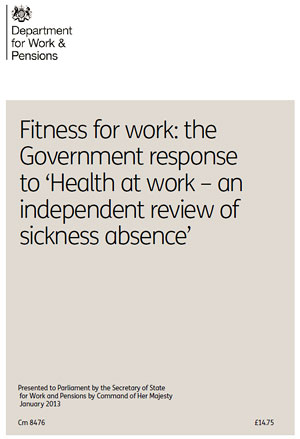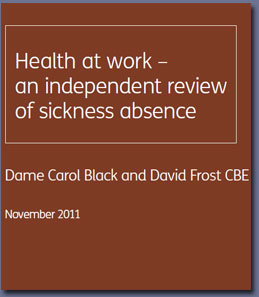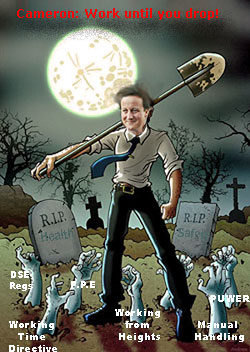 |
 |
|
Ignored The Government Attack On The Disabled? - Now They're Whilst the majority of working people have ignored the attacks the government have been making upon the disabled, the unemployed, and the social security system; the latest Government attacks are now being waged against working people on sick leave of 4 weeks or more. So if you have real Flu, had a major operation, and are off work for 4 weeks - no sick pay until you've been assessed! Forget employer’s Occupational Health Services or their responsibility to minimise illness at work, forget the GP who acts in the sole interest of their patient, and forget the view that prevention is better than cure. The new approach to worker’s sick absence is one of bullying people back to work and instilling fear into those who need to take sick leave in the first place.
The Government's response to Dame Carol Black's review was presented to Parliament by the Secretary of State for Work and Pensions in January this year, and details the Governments approach to workplace sick absence of more than 4 weeks, with the introduction of the same regime currently being used to victimise those unemployed and on social security because of ill-health and disability. In short their approach is this: The establishment of a health and work assessment and advisory service to make occupational health advice more readily available to employers and employees, so they can better manage sickness absence. So the amoral, victimising and bullying service provided by ATOS will be extended to those on sick leave, as no doubt the French company will be given contracts to run the new assessment service from 2014. The Dame Carol Black and David Frost MBE report entitled ‘Health at work – an independent review of sickness absence’ (first available from the Unionsafety E-Library 22nd Nov 2011) came up with 13 recommendations, which will make life for those off sick from work even harder still: 1. Government should fund a new Independent Assessment Service (IAS). The IAS would provide an in-depth assessment of an individual’s physical and/or mental function. It would also provide advice about how an individual on sickness absence could be supported to return to work. This service should usually be accessed when an individual’s absence spell has lasted around four weeks. 11. The introduction of a new job-brokering service to help long-term sick employees find new work (where appropriate) before they fall onto the benefits system. This service should be offered free by the State in cases of very long-term absence (at 20 weeks or sooner if the Government is convinced of the business case to do so), but should be available earlier for individuals and employers that are willing to pay for it. Government should consider delivering the service as an extension of the Work Programme. The Secretary of Sate For Work and Pensions Lord Frued says in the introduction to the Government’s response to the Dame Carol Black report: ‘Our aim is to build a framework where individuals, employers and healthcare professionals work together to support continued connection and early return to the labour market. If we can achieve this, the benefits are compelling – for employers through reduced sick pay and increased productivity, for the State through reduced long-term worklessness, and most importantly for the long-term future of people at risk of losing touch with the world of employment.’ The Government appears to have accepted all of the 13 recommendations, but goes even further in implementing recommendation 1: “The [new] Independent Assessment Service will provide case management for the minority of employees with complex needs who require ongoing support to enable their return to work.” Unsurprisingly recommendation 11 is not fully accepted by the government, as it rejects the idea that specific support should be given to those unable to return to working for their existing employer. It simply dumps them into the general population of unemployed people stating that they can utilise the Universal Jobmatch, a free internet job-matching service launched in November 2012.
In other words, person off work due to illness lasting 4 weeks will be sent for assessment before being given SSP. How anyone can consider this to be a sensible way forward and a way of increasing productivity and reducing sick absence, God only knows. All of this is no surprise given that this Tory-led coalition government believes that disability, work related ill-health and sick absence are all mere facets of a lazy and work-shy population wanting something for nothing! Businesses who make workers ill are of course innocent of anything other than making profit for the good of the country; and any penalties against them should be either non-existent or as minimal as possible. Further, the Tories and LibDems believe that accidents are a fact of life and cannot be avoided and therefore to legislate to try to prevent such things is pure Red Tape! Bullying and victimisation is not just a systemic problem within the British management style, it is also endemic within the Government approach to all things to do with the working environment. The Tory mantra is simply this: Work Until You Drop Dead! Download the two reports concerned from the E-Library Database using the keyword 'sick absence' Source: DWP / Unionsafety / Hilda Palmer See Also: GPs To Lose Right To Manage Patients Long-Term Illness |


 Similarly, the government rejects recommendation 12 which says that the Government should end the Employment Support Allowance (ESA) assessment phase altogether.
Similarly, the government rejects recommendation 12 which says that the Government should end the Employment Support Allowance (ESA) assessment phase altogether.